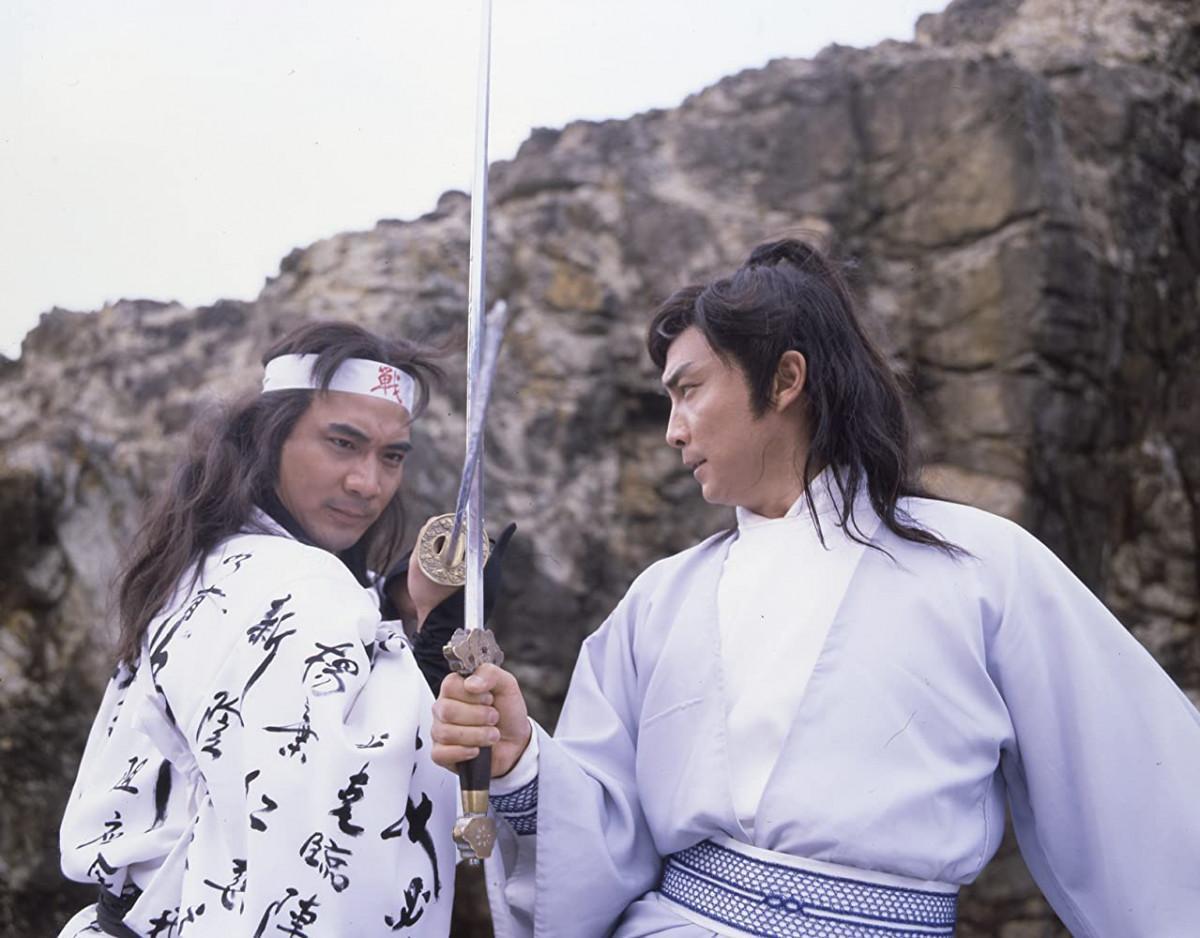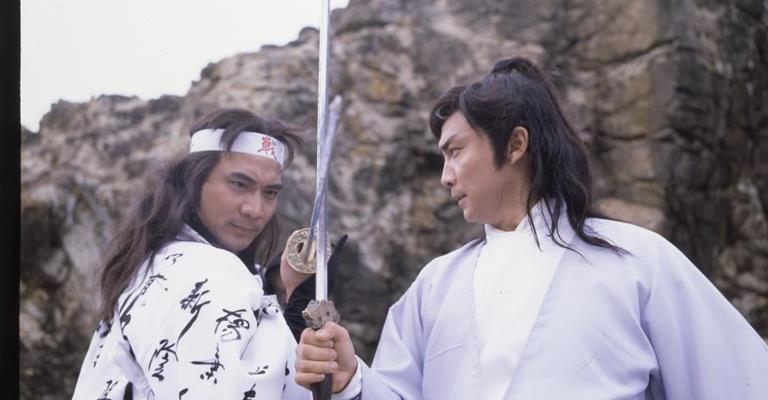
It may look like just another early 80s period style martial arts film, with a title that immediately denotes the key theme and purpose of the film. Yet, Duel to the Death (referred to in this review as Duel) manages to surprise the audience. Duel has cheesy moments of melodrama (common in many Hong Kong films of this era) but the way the film builds its tension through its bleak narrative makes it more masterful than it initially presents.
Personally, these style of films with wire-fu, long gowns and stylized sword play have never been, my choice of a martial arts film. In the 80s and 90s, martial arts cinema preference for me, and no doubt for many of you, was dominated by movies starring Jean Claude Van Damme, Jeff Speakman and Mark Dacascos, and with frequent dives into movies with legends like Bruce Lee or Chuck Norris. There was something more thrilling and realistic, given the grounded contemporized setting favoured by most of these stars – that in itself would lend to a greater affinity and relatability. With the popularity of MMA in the public consciousness, more modern martial arts stars like Donnie Yen, Scott Adkins, Mark Strange, Tony Jaa and Michael Jai White continue to champion this movement, and by extension promote more combat realism.
The films with swordsmen flying through the air never really appealed to me, not even when Ang Lee’s Crouching Tiger, Hidden Dragon took Hollywood by storm, clinching Best Foreign Language Film at the Oscars in 2000. This style of film, was never my cup of tea. However, late one night, I was recently perusing a back catalogue of Golden Harvest films, and rewatched one of Scott Adkins’s favourite docos, Best of the Martial Arts Movies, presented by the late great John Saxon. By virtue of this reminder, I caught a glimpses of scenes from Duel and this piqued my interest – some 37 years after this movie was released.
Duel is set during the Ming Dynasty, with a predetermined bout between two of the most highly skilled swordsmen from China and Japan, occurring every decade. The bout or more aptly named death duel is between a Chinese swordsman named Ching Wan (Damian Lau) and Japanese samurai, Hashimoto (Norman Chu). Although the movie does not demonise Japan as much as say Fists of Fury or Beach of the War Gods, the story is still very much centred around the rivalry between the two nations. This is a common cultural cinematic trope prevalent from the 1970s onwards, especially within Hong Kong action cinema. Though Duel is not as heavy handed in its nationalism or jingoism, it still does have a subplot of the Shogun orchestrating the kidnapping Chinese martial artists to strengthen Japan. Yes it is as bizarre as it sounds, but this perhaps serves as an additional layer to add more emotional weight between the two warring nations. Being a secondary plot line, the main event is of course the death duel itself, which occurs on a perilous cliff face, complete with the requisite gravity defying combat.
In terms of characters, Hashimoto is viewed as more ruthless, yet still adheres to the honour bound code of bushido. This is somewhat contrasted by the Chinese swordsman Ching Wan who is portrayed as more compassionate and easy going. There are hints of respect between the two adversaries, during one juncture where they both team up Hobbs and Shaw style, albeit to fight ninjas in a forest. Regardless, the tone of the film becomes progressively more grim, in many ways there is a hopelessness to the fate of both protagonists with closing act of the film, potently shocking and horrific.
As genres, horror and thriller films manage to build up the tension, where a violent final act reaches a crescendo that will stay in the consciousness of the viewer for many hours, if not days or even weeks. Yet Duel is neither horror nor thriller. Evidently, there are some minor supernatural elements due to the presence of ninjitsu, yet even as a simple period martial arts film it manages to achieve the same shock ending prevalent in a Lucio Fulci or Mario Bava horror film.
In the martial arts film genre, the whole basis for rivalry is contingent upon various elements whether it be nationalism, honour and duty, revenge for a fallen master or a myriad of other clichés. The simple good vs. evil theme is formulaic and will prompt us as viewers to celebrate a hero’s victory and the villain’s demise. Yet in something like Duel, there is a clear moral ambiguity between the two rivals. For example, one may be a clear anti-hero and hence it doesn’t necessarily make him ‘bad’ per se. Without spoiling the totality of the film’s climax, it does render the audience shell shocked with its outcome. It is unclear if the director was deliberately seeking to establish a commentary on the futility of violence, but to some degree the brutal ambiguity of the ending is perhaps as ambiguous as the character motivations themselves.
Duel’s Director, Ching Siu-Tung, may not be as well-known as other Hong Kong film makers, like John Woo, Yuen Woo Ping or Corey Yuen who each migrated to Hollywood movies. Despite Ching directing the awful Steven Seagal actioner, Belly of the Beast, his skills as a director are by no means lackluster. In the early 2000s he had enjoyed international recognition with Shaolin Soccer, The House of Flying Daggers and most notably, Hero which had the benefit of a massive marketing endorsement by the iconic Quentin Tarantino himself. In fact, Tarantino was the primary reason the film received a Hollywood release.
Certainly, Duel to the Death can be categorized as one of Ching’s best works due to its simple yet serious narrative, incredible wire-fu choreography, practical special effects and a tragic conclusion – one which you won’t see coming. As the Cantonese pop song plays over the scrolling credits, the audience is left lingering on the final shot, during which time you are left feeling as shaken and exhausted as both adversaries. If you are seeking something retro and obscure from martial arts cinema, Duel to the Death comes highly recommended.

